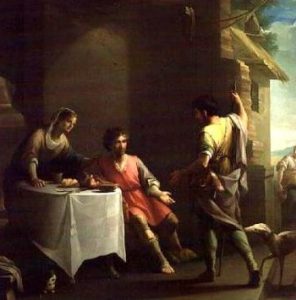Today is April first – the day that is also known as ‘April Fool’s day’. The Biblical Hebrew word for ‘fool’ is ‘ksil’ {כסיל} and it is common to find this word mainly in the Book of Proverbs, for example:
“A fool takes no pleasure in understanding, but only in expressing his opinion.” (Proverbs 18:2)
The word ‘Ksil’ (‘fool’ in Hebrew) shares the same root and sound as the ninth Hebrew month in the Jewish calendar – ‘Kislev’ {כסליו} (the month of ‘Chanukah’). In Akkadian – one of the ancient languages of the Middle East – the meaning of this root K-S-L {כ-ס-ל} is ‘hunting’.

Every English speaker knows that the word ‘peasant’ means a ‘farmer’ but also uses as a synonym for ‘ignorant’ or ‘fool’. The same thing can be found in this case but instead of a ‘peasant’ that was the symbol of ignorance in medieval Europe, in the Ancient East and especially during biblical times – the hunter was the stereotype for ‘fool’.
The reason for that – which is similar to the medieval peasant – is what the ‘hunter’ represented and that was the stagnation and the unwillingness to adjust to the new economic system of growing food and domesticated animals.
The best biblical example for this is probably the case of Esau. When the Bible tells us about Esau and his brother Jacob, the differences between them is crystal clear. The two brothers are the complete opposite of one another. This contrast between both brothers stands out when the Bible mentions both brothers’ occupation:
“When the boys grew up, Esau was a skillful hunter, a man of the field, while Jacob was a quiet man, dwelling in tents.” (Genesis 25:27)
Now, we can understand that the difference between Jacob and Esau is more than just their occupation but rather what it symbolizes.
